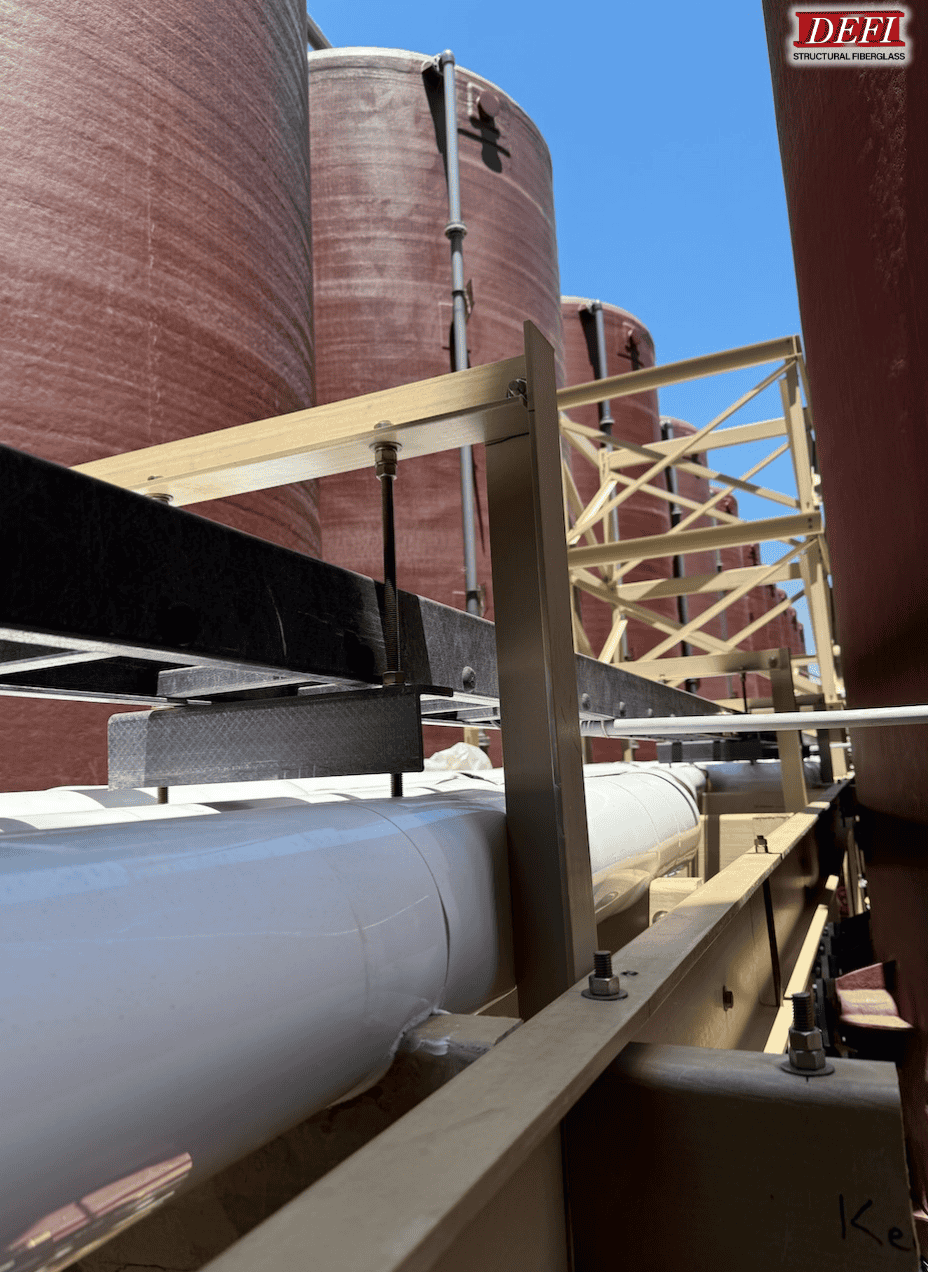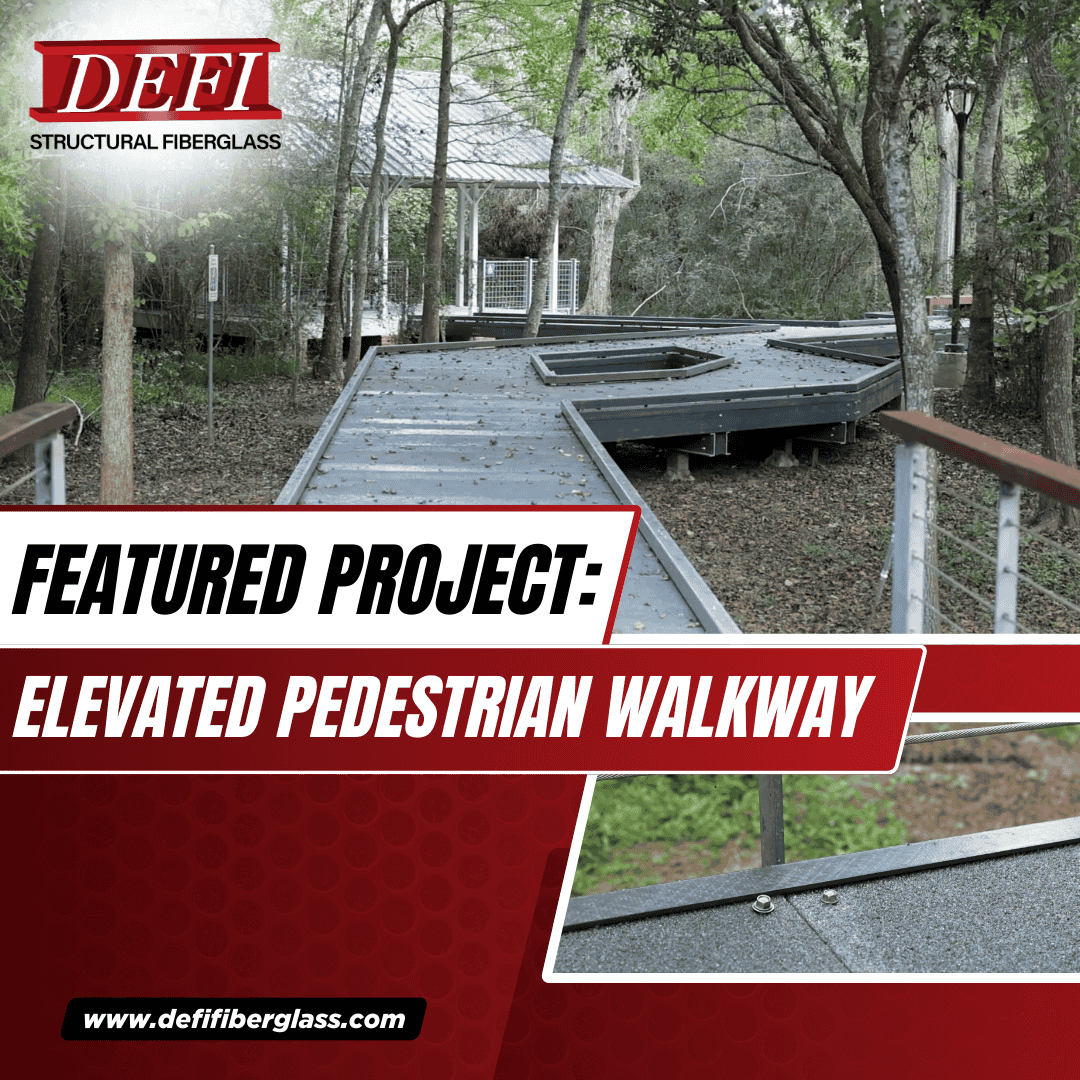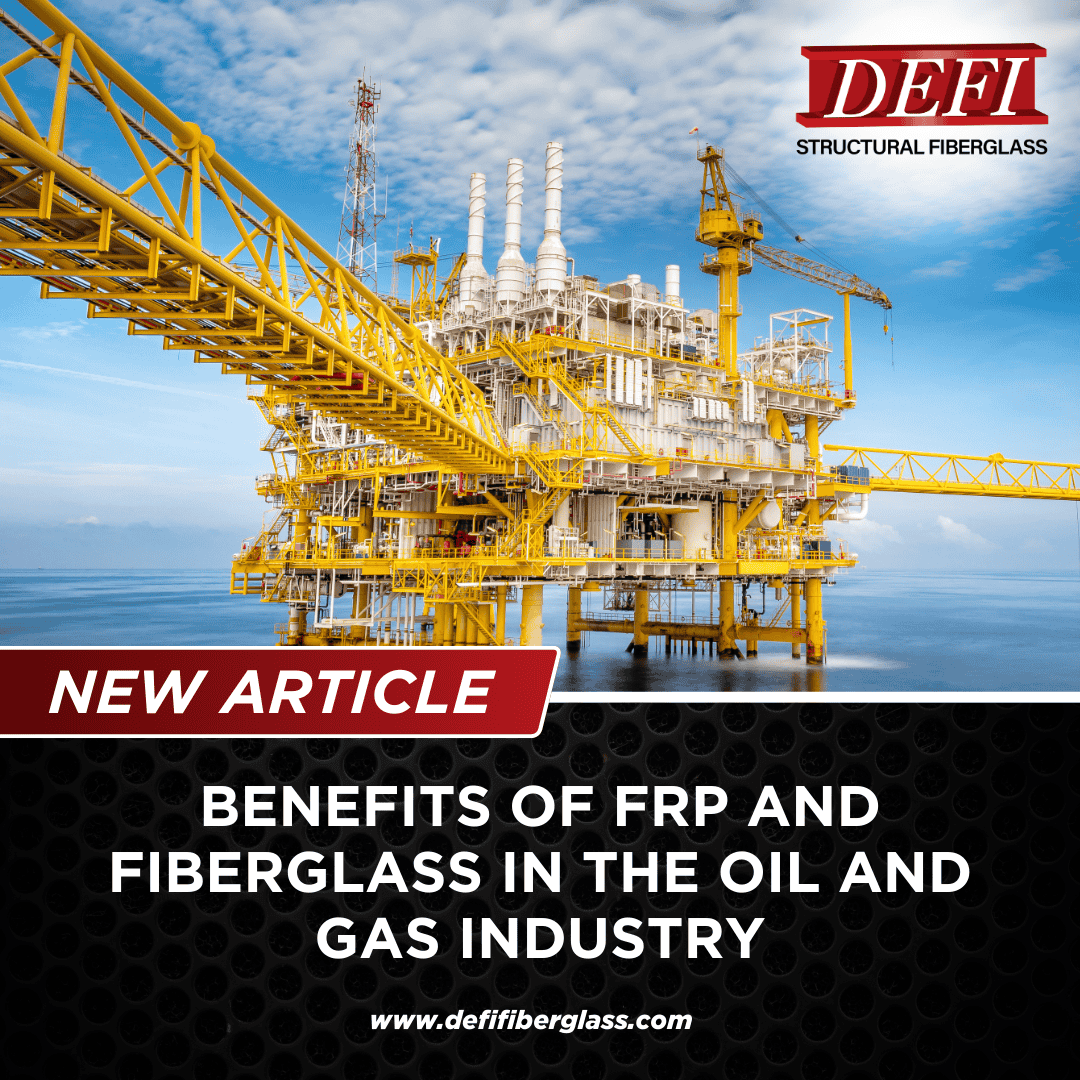A: POUND FOR POUND, FIBERGLASS IS JUST AS STRONG AS ITS COUNTERPART IN STEEL. SO WHAT THAT MEANS IS, THAT IF YOU HAVE A BEAM THAT’S A QUARTER INCH THICK FOR INSTANCE; IT WOULD NOT NECESSARILY BE A QUARTER INCH THICK IN FIBERGLASS. SO WE MAY HAVE TO GO A LITTLE BIT DEEPER, A LITTLE BIT THICKER ON OUR STRUCTURAL MEMBERS.
This is a question that we get asked more than any other question when we have buyers who are considering fiberglass as an alternative to traditional materials, especially steel.
Steel is one of the most common building materials used worldwide due to its supreme tensile strength that tops out at nearly 60,000 psi. However, when you look at the strength to weight ratio, fiberglass outperforms steel by a longshot offering the same strength as steel with greater flex, which means it’s more durable and impact resistant. All of this and the fiberglass counterpart is only a fourth of the weight of steel while still offering the same strength. It is also stronger than steel in the lengthwise directional, providing better reinforcement for load-bearing implementations such as loading ramps.
The reason so many warehouse facilities, waterparks, chemical plants, and other industrial companies are asking about fiberglass in comparison to steel is because steel is not stronger than fiberglass and also has some serious disadvantages due to its makeup.
THE DISADVANTAGES OF STEEL
Prone To Corrosion
Steel as anyone who was worked in corrosive environments will tell you, corrodes. Even if it’s stainless steel it is still prone to corrosion and rust from many different reactive chemicals as well as moisture. In fact, certain materials such as sulfuric acid can corrode steel quite quickly which can pose a serious structural integrity hazard in a harsh industrial environment. Corroded steel is reduced in its load capacity and durability which can lead to employees falling through steel grating, or steel beams breaking under stress.
Steel Is Expensive
Steel is quite costly, and with the recent tariffs on imported steel that have been enacted—the price continues to climb. Let’s take steel grating for example. Currently, at around at least $400.00/sq. ft., furnishing your plant with steel grating can be a huge burden on your operating expenses and deplete a large portion of working capital for most companies.
Not Enough Flexibility
Steel by composition is a very rigid and heavy metal, and admittedly that is part of its draw while also being a serious drawback. Rigid materials are great for strength and durability, but because there is no flex it also makes steel susceptible to denting from impact. Not only that, due to steels weight, your facility may need to spend even more extra money to reinforce concrete so that the extra weight of steel can be accommodated, this is actually a common problem for companies using steel grating for platforms and decking.
Highly Conductive
Since steel is a metal, it is an excellent conductor of electricity, which is bad for safety when working in an environment that poses a shock hazard. Workplaces such as an electrical plant, waterpark, or chemical plant where electrical tools and other shock risks are present are a poor choice for steel and high safety risk.
While all of these are serious disadvantages to using steel in
THE BIGGEST WEAKNESS WITH STEEL IS CORROSION
As you can see, steel can potentially pose a clear and present danger to workers in the workplace DEFI has experienced that firsthand with one of our water treatment plant clients. We were contracted to replace their steel grating that had become dangerously corroded and had been structurally compromised. Unfortunately, this corrosion was only noticed because a workplace accident occurred. An employee actually stepped through a hole that the corrosion caused and severely gashed his leg as he well through. Almost 30 staples later and several months of recovery will never give back that employee the time lost and the pain they suffered.
This could’ve easily been avoided by switching to fiberglass grating from DEFI. Thankfully the company realized their error as well and now featured DEFI fiberglass grating throughout their plant and no employee will be at risk ever again.
YOU CAN CHECK FOR SIGNS OF CORRODED STEEL
As this company learned the accident could’ve been avoided in a very economical and secure fashion had they upgraded to DEFI’s fiberglass grating products which they did after the accident. While there is a lot to be learned from accidents such as these, we understand that overhauling an entire plant with fiberglass is not feasible in one fell swoop. However, if you know what to look for, you can at least spot trouble areas and replace those sections piece by piece with fiberglass. When inspecting your steel structures check for things like:
Severe Rust
Rust is one of the most common guaranteed signs that steel is corroded or nearing corrosion. Oxides that form on the steel due to electrolyte exposure such as saltwater appear red or brown in color. This rust will eventually eat through the steel layer by layer until it is brittle and weak, which can cause injury.
Pitting
Pitting is similar to acne in skin care, the reason we say that is because the surface of the steel literally develops pits or tiny holes due to contact with corrosive substances. These pits expand and eventually lead to fractured steel.
Flaking And Thinning
Once rust has fully set in on a section of steel, layers of the steel composition will flake off and it will develop thin spot in the steel. These thin spots have greatly reduced strength and can become severely compromised.
Due Diligence Is Key
If you are diligent in frequent safety inspections of your facility, you can catch corrosion before it poses a dangerous risk. You should make sure to note any corrosive risk factors like exposure to saltwater, acids or excessive moisture. In these areas, make sure to inspect even more frequently as the corrosive materials can speed up corrosion quicker than in places where there’s no exposure.
GET STRONGER AND LIGHTER WITH FIBERGLASS FROM DEFI
Our reinforced fiberglass products are the absolute best solution to increasing safety in the workplace and eliminating the dangers of steel corrosion. When you trust DEFI with your fiberglass upgrade you are investing in long-term value, durability, and better risk management. There are many other advantages of our fiberglass products:
Fiberglass Is More Economical
The most notable difference you will see when switching to fiberglass grating will be in your bottom line. While fiberglass may cost a bit more in initial cost; its durability, strength and duty life make it by far a much more long-term economic solution. You won’t need to spend money on heavy installation equipment, no reinforcing of concrete foundations, and you can implement fiberglass in ANY environment, corrosives or not.
More Efficient
When it comes to saving your company money without compromising on durability and strength, nothing beats DEFI fiberglass. Our fiberglass products are so much more versatile than steel and can be used in any application including those steel just can’t be implemented in. Fiberglass, for example, can be used in electrical plants and off-shore drilling platforms without any risk of electrical shock or corrosion from saltwater. Also since our products weigh so much less than steel, shipping costs of our product are far less than with steel which is extremely heavy. Also, once you install DEFI fiberglass products, you won’t have to spend any time on maintenance—or products require none when installed and used properly.
No Shock Hazard
Electrical hazards and accidents resulting from them are on the rise in many plants across the US. As industrial plants rely even more on computers, robotics, and electronics more than ever before, electrical hazards will continue to increase in plants with steel structural products. But in plants that have embraced DEFI fiberglass, they are operating without that worry hanging over their head.
Contact us today to see how your company can benefit from the safety, efficiency, and durability of DEFI fiberglass products.



